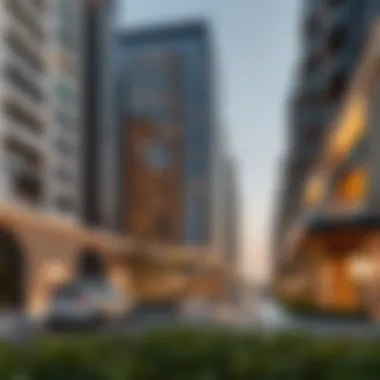The Dynamics of Business Villages in Dubai's Real Estate


Intro
In recent years, Dubai's real estate sector has witnessed a remarkable transformation, evolving into a dynamic landscape characterized by the emergence of business villages. These unique developments act not merely as clusters of commercial spaces but also as vibrant ecosystems that foster innovation and entrepreneurial growth. Understanding the intricacies of these business villages is essential for investors, property managers, and other stakeholders who are eager to navigate this complex yet rewarding terrain.
This article aims to shed light on the role of business villages within Dubai's real estate framework, analyzing their operational structures, economic advantages, and community engagement aspects. We will delve into potential investment opportunities available in these areas and project future trends. As we venture into this discussion, it becomes increasingly clear that business villages are not just a passing trend; they are become critical components of Dubai's expanding economy.
Property Trends in Dubai
Dubai's property sector has always shown an ability to adapt and evolve. With the rise of business villages, certain trends have become more pronounced, shaping the real estate landscape.
Emerging Neighborhoods and Hotspots
These villages are sprouting in various locales, often replacing traditional business districts. For instance, areas such as Dubai Design District and Dubai Silicon Oasis have transformed into bustling hubs where creativity meets commerce. These neighborhoods offer a mix of office spaces, retail areas, and even residential setups, appealing to a diverse range of occupants.
What makes these spots particularly enticing is their focus on community and collaboration. Engaging atmospheres, pedestrian-friendly layouts, and accessible amenities contribute to the allure. Who wouldn't want to work in a place that feels more like a community park than an office complex?
Market Analysis and Future Predictions
Market analysts predict that business villages will continue to gain traction. As remote work becomes a norm, flexible workspaces within these villages become essential. Many investors are sharpening their eyes on these emerging trends. Future predictions indicate a steady increase in demand for properties within these bustling communities, urging developers to adapt and innovate.
Moreover, as Dubai continues to transform into a global business melting pot, new businesses will flock to these areas, creating a cycle of investment and growth. The very nature of these hubs caters to the ever-growing desire for connectivity, making them worthy of attention for any serious investor.
Investment Opportunities
When it comes to investing within Dubai's business villages, opportunities abound.
High-ROI Property Types
Investors should look at various property types that yield high returns. Retail spaces in areas like Dubai Design District often attract premium rental rates. Furthermore, co-working spaces are thriving as companies lean towards flexible work environments. These setups not only capitalize on the trend of remote work but also enhance community spirit.
Financing and Mortgage Options
Understanding financing options is key. Many local banks and financial institutions provide specific mortgage products aimed at investors seeking property in these communities. For instance, Emirates NBD offers a range of financing solutions tailored for real estate investments in Dubai. Utilizing such resources can significantly ease the path to ownership in lucrative business environments.
Preface to Business Villages
In the ever-evolving realm of Dubai's real estate sector, the concept of business villages has emerged as a pivotal player. These clusters of enterprises not only provide a hub for various industries but also stand as a testament to the visionary approaches adopted by developers and investors in the region. Understanding the intricacies of business villages is crucial for stakeholders ranging from real estate agents and property managers to prospective buyers marveling at these modern-day economic ecosystems.
Defining Business Villages
At their core, business villages can be described as purpose-built developments that house multiple businesses, fostering a collaborative atmosphere conducive to networking and innovation. Think of them as miniature economic towns—where all that one needs for trading, commerce, and business facilitation exists within arm's length. Typically, these entities are designed with specific industries in mind, which can range from tech startups and creative agencies to healthcare and trade-related businesses.
Unlike traditional office buildings, which often isolate companies in towering structures, business villages promote a sense of community. Through shared infrastructure, amenities, and resources, they create an environment where collaboration breeds growth. For instance, a local entrepreneur setting up a small coffee shop in a business village benefits from nearby talent and numerous professionals who may become regular customers. In short, business villages encapsulate the essence of collective business spirit while promoting economic resilience.
Historical Context
The rise of business villages in Dubai can be traced back to the mid-1990s when the government first recognized the need for a structured business framework to attract foreign investments and small enterprises. The establishment of Dubai Internet City in 1999 can be seen as a milestone in this journey. With its creation, the landscape for technology firms drastically shifted. Entrepreneurs began to flock to these zones, drawn by tax incentives, modern infrastructure, and a talented labor pool.
Over the years, the concept of business villages evolved, influenced by global trends and local demands. As Dubai transitioned into a global business hub, refined offerings emerged, such as Dubai Design District, catering specifically to creative industries. The historical trajectory showcases an adaptive approach, where business villages not only responded to market demands but also anticipated future trends, thereby enabling businesses to thrive in a competitive environment.
As the world leans into digital transformations and sustainable practices, the evolution of business villages in Dubai reflects a broader narrative—a narrative rooted in innovation, community, and economic synergy. Understanding this context sheds light on how these environments are not merely real estate ventures but essential components shaping the future of business in the region.


Economic Significance of Business Villages
Business villages hold a pivotal role in the economic framework of Dubai, significantly impacting not only the local economy but also the broader real estate landscape. These enclaves provide unique opportunities for entrepreneurs, small businesses, and investors looking to establish roots in a rapidly growing market. The essence of business villages transcends mere bricks and mortar; they act as vibrant ecosystems fostering innovation, collaboration, and economic resilience.
Impact on Local Economy
The economic influence of business villages can be seen across various dimensions. To begin with, they promote local spending. When businesses set up shop in these areas, they don't just cater to a global clientele; they also attract local customers. This creates a ripple effect, whereby profits are reinvested within the community, supporting other local enterprises.
Moreover, these villages often align with government initiatives aimed at diversifying the economy. Programs such as the Dubai Economic Agenda 2030 emphasize attracting investments focused on knowledge and services, which aligns precisely with the objectives of many business villages.
The presence of these hubs also enhances real estate values in the area. As they flourish, nearby locations become more desirable, leading to an increase in property prices. Investors and property owners can thus reap returns on their investments as the surrounding infrastructure improves and demand rises.
According to economists, even a small business village can inject millions into the local economy. This is not just through direct job creation, but also through increased tax revenues and enhanced local spending.
"Business villages are the heartbeat of Dubai's economy. They stimulate growth, create job opportunities, and foster a self-sustaining community ecosystem."
Job Creation and Opportunities
Another crucial aspect of business villages is their role in job creation. They serve as incubators for entrepreneurship and innovation, attracting a diverse range of talents and skills. From tech startups to retail stores, the variety of businesses leads to numerous employment opportunities in different sectors.
- Direct Job Creation: As businesses open or expand, they require staff. This creates a demand for jobs across various skill levels, improving employment rates within the locality.
- Indirect Job Opportunities: The presence of a business village can attract support services such as logistics, maintenance, and consultancy, further enhancing job prospects.
- Skill Development: Many business villages engage in training programs or workshops, thereby fostering a skilled workforce tailored to meet the specific needs of the market.
These aspects are particularly significant in a city like Dubai, where the demand for jobs is continually increasing. Housing a plethora of diverse businesses, business villages not only provide employment but also serve as a platform for networking and collaboration, thus fortifying the overall labor market in the region.
By nurturing entrepreneurial spirits and attracting talent, business villages make substantial contributions to economic sustainability and growth in Dubai.
Characteristics of Business Villages
Understanding the characteristics of Business Villages in Dubai sheds light on how they function and thrive in a competitive landscape. These features not only illustrate the essence of these places but also provide insights into their impact on the local real estate market. The unique blend of design, infrastructure, community interaction, and networking opportunities creates a synergistic environment fostering growth and development.
Design and Infrastructure
The design of these business hubs plays a crucial role in attracting businesses and clients. Business Villages in Dubai often follow a well-thought-out architectural plan. They incorporate cutting-edge technology and sustainability features that align with the emirate’s vision of becoming a smart city. For example, buildings are frequently equipped with energy-efficient systems that contribute to both environmental sustainability and reduced overhead costs for businesses.
- Flexible Workspace Solutions: The layout is usually customizable, allowing companies — from startups to established enterprises — to create workspaces that suit their needs. This flexibility is a significant draw for diverse businesses.
- Connectivity: Excellent transport links, including access to major highways, public transport, and proximity to Dubai International Airport, enhance the appeal further. Companies benefit from efficient logistics and improved accessibility.
- Amenities: Essential facilities such as meeting rooms, cafes, and recreational areas not only enhance the work-life balance but also promote a collaborative culture among tenants.
Investors keen on real estate opportunities should consider these infrastructure aspects as they contribute to the overall value proposition of Business Villages. A well-designed space increases tenant satisfaction and retention, thus ensuring a steady revenue stream.
Community Interaction and Networking
Community interaction in Business Villages is vital for fostering collaboration and innovation. These environments are intentionally designed to promote networking among business owners and professionals.
- Event Spaces: Many villages provide dedicated spaces for workshops, seminars, and networking events. This design encourages knowledge sharing and collaboration. Entrepreneurs can meet potential partners, clients, and suppliers, nurturing business relations.
- Supportive Ecosystem: The community often includes a mix of businesses from various industries. This diversity can lead to unexpected collaborations, fostering unique product development or service offerings that might not emerge in a more homogeneous environment.
- Networking Opportunities: Informal gatherings, such as weekly meet-ups or social events, empower individuals to form relationships beyond mere business transactions. These connections can lead to mentorship opportunities and partnerships that propel businesses to new heights.
"The value of networks in business cannot be overstated; they serve not just as connections but as catalysts for change and growth."
Investment Opportunities within Business Villages
Investment in business villages in Dubai presents a plethora of unique opportunities for diverse stakeholders ranging from individual investors to large corporations. These villages are not just geographical locations; they are vibrant ecosystems that facilitate business growth and collaboration. As the Dubai real estate landscape evolves, understanding the investment opportunities that these villages offer becomes crucial for anyone looking to capitalize on this dynamic market.
Investors may find attraction in business villages due to their strategically located infrastructure and community-oriented design, fostering an environment conducive to networking and innovation. Beyond just property development, investing in business villages can yield substantial returns, driven by a surge of interest from both local and international investors. The proximity to major transportation hubs, favorable business regulations, and governmental support further enhance these advantages.
Types of Investments


Within business villages, various forms of investment can be pursued. Here are some key types:
- Commercial Real Estate: Many investors opt for office spaces and retail units, which tend to have a solid demand due to the increasing number of startups and SMEs in Dubai. The design and layout of these spaces cater to modern businesses that value collaboration and accessibility.
- Co-Working Spaces: The rise of remote work and gig economy has led to increased interest in co-working facilities. These spaces not only offer flexibility but also allow entrepreneurs to build networks without the costs associated with leasing traditional office spaces.
- Retail Outlets: With consumer spending on the rise, opening retail shops in business villages can be lucrative. These outlets benefit from foot traffic from professionals working within the villages.
- Startup Incubators: Investors might consider establishing or funding incubators aimed at nurturing startups. These entities can leverage the synergy within business villages to foster innovation.
Each type of investment offers its own set of advantages, and prospective investors should weigh these carefully against their goals and risk tolerance.
Risk Assessment
Every investment carries inherent risks, and those within business villages are no different. To navigate these uncertainties, investors must conduct thorough risk assessments. Key considerations include:
- Market Fluctuations: The real estate market, while buoyant in Dubai, can experience fluctuations. Investors should keep an eye on economic indicators that influence property values.
- Regulatory Changes: Dubai’s regulatory framework can evolve, affecting business operations and investment returns. Staying informed about changes and compliance requirements is essential.
- Competition: As more investors recognize the value of business villages, the competition for space and resources intensifies. Newcomers might find it hard to carve out a market share among established players.
- Community Dynamics: The viability of investments is often tied to community interaction. If the social and business dynamics within the village are not conducive, the investments may not yield expected returns.
Understanding these risks allows investors not just to mitigate potential losses, but also to tailor their strategies in a way that maximizes their chances of success.
Case Studies of Successful Business Villages
When discussing the landscape of business villages in Dubai, it is crucial to look at case studies of successful examples. These instances not only showcase the potential these areas hold, but they also provide invaluable insights for investors, entrepreneurs, and planners looking to navigate this dynamic market. Understanding what has worked—and what hasn’t—can shape future developments and strategic decisions in Dubai's real estate sector.
Analyzing Prominent Examples
A number of business villages have become benchmarks for success in Dubai. One such example is the Dubai Technology Entrepreneur Centre (DTEC). DTEC has established itself as a thriving hub for technology startups. The infrastructure is designed specifically to foster innovation and networking among tech entrepreneurs. Its success lies in several factors:
- Tailored Facilities: The environment is outfitted with modern office space, meeting rooms, and communal areas that cater to the needs of tech-focused companies.
- Networking Opportunities: Regular meetups and workshops often feature industry leaders sharing their experiences and knowledge.
- Government Support: As part of Dubai Silicon Oasis Authority's initiative, DTEC offers several incentives, including grants for startups and easy access to funding.
Another notable example is Dubai Design District (d3), which has effectively attracted a growing number of designers and creative industry professionals. Several elements underpin d3’s success:
- Cultural Integration: The village promotes local art and culture, making it more than just a business location but a community that celebrates creativity.
- Strategic Location: Situated near Downtown Dubai, the accessibility has contributed to its desirability.
- Dynamic Programs: Constantly hosting events, exhibitions, and trade shows ensures that it remains a focal point for the design-oriented sector.
These cases illustrate that successful business villages are more than mere collections of offices; they integrate community, support systems, and cultural vibrancy that appeals to diverse groups.
Lessons Learned from the Past
Evaluating past successes and failures can illuminate critical lessons for ongoing and future projects in Dubai's real estate. Here are key takeaways:
- Adaptability is Key: Business models must evolve as market demands change. For instance, many villagers initially focused on tech had to pivot to accommodate new sectors.
- Community Engagement Matters: Fostering a sense of belonging among tenants creates loyalty and encourages long-term commitment. Those villages that facilitated community interactions often saw higher retention rates.
- Government Policies Play a Role: Regulatory environments can make or break business villages. Keeping abreast of changes in policy is vital, especially those that affect foreign ownership and operation.
- Sustainability Trends Influence Design: Incorporating sustainable practices is no longer optional; it is becoming a necessity. Successful business villages have embraced green initiatives to appeal to eco-conscious tenants.
"To build a successful business village, one must nurture not only the businesses but also the community around them. Engagement and connection are the glue that holds everything together."
In the grand scheme, the case studies serve as a roadmap, offering strategies to future developers and investors wishing to contribute to Dubai's vibrant real estate market. Recognizing what has resonated with occupants can significantly impact the viability and longevity of business villages, ultimately shaping the economic landscape in Dubai.
Challenges Faced by Business Villages
In the ever-evolving landscape of Dubai’s real estate, business villages are gaining traction as hubs for innovation and collaboration. However, these entities face a unique set of challenges that can impact their longevity and success. Understanding these hurdles is not just beneficial; it is essential for investors, agents, homeowners, developers, and planners aiming to navigate this dynamic environment effectively.
Market Competition
The competition amongst business villages in Dubai is fierce, akin to a dog-eat-dog scenario where only the fittest thrive. With numerous integrated business zones popping up, retaining an edge over competitors becomes paramount.
Several factors contribute to this competitive atmosphere:
- Location and Accessibility: Proximity to major transport routes and residential areas can significantly influence a village's appeal. Business villages located near highways or metro stations tend to attract higher foot traffic.
- Services and Amenities: Villages offering a range of amenities, such as conference rooms, cafes, and recreational spaces can differentiate themselves from the rest. A comprehensive service palette can turn a potential buyer's head.
- Brand Reputation: Many businesses flock to areas with established reputations. A business village known for innovation in technology may attract tech startups, but it requires a commitment to maintaining that image over time.


As competition intensifies, business villages must continuously evolve and adapt to changing market demands. If they don’t, they risk becoming like old news – forgotten and overlooked.
Regulatory and Compliance Issues
Navigating regulatory waters in Dubai can feel like trying to walk a tightrope. Several compliance requirements can pose challenges to business villages as they aim to grow.
- Licensing: Each business operating within a village must secure the appropriate licenses from relevant authorities, such as the Department of Economic Development. This can be a tedious process and delays may lead to financial strain on businesses waiting for approval.
- Zoning Laws: Business villages must adhere to specific zoning regulations that dictate the types of activities allowed within their boundaries. Changes in zoning can result in unexpected challenges for current businesses and deter potential investors.
- Environmental Regulations: As sustainability gains momentum, villages must be compliant with local environmental standards. This includes waste management, construction practices, and energy usage. Failing to comply can attract hefty fines or, worse, shutdown orders.
"Understanding the challenges faced by business villages is the first step towards leveraging their potential for economic benefits and community development."
To deepen your understanding, resources such as the Dubai Economic Department provide insights on regulations and licensing, while community forums like Reddit are valuable spaces for real-time discussions and experiences shared by business owners.
The Future of Business Villages in Dubai
The future of business villages in Dubai holds considerable promise, reflecting not only the economic trajectory of the region but also the evolving landscape of real estate. As global interest in Dubai continues to grow, these business enclaves are poised to play a pivotal role. They are more than just a collection of offices and retail spaces; they are dynamic environments encouraging innovation, collaboration, and entrepreneurship.
Looking ahead, one pivotal question arises: How will these business villages adapt to meet the challenges and opportunities of a rapidly changing economy? Their unique characteristics, such as fostering community and facilitating networking, will be crucial in shaping their future.
Emerging Trends and Innovations
As Dubai pushes toward becoming a global innovation hub, the business villages are not left behind. The integration of smart technologies and sustainable designs is at the forefront of this evolution. One key trend is the adoption of digital platforms for business operations. Companies within business villages are increasingly utilizing cloud technologies, which allow for efficient management and collaboration from anywhere in the world.
Additionally, flexible workspaces are gaining traction. Co-working spaces within these villages cater to freelancers, startups, and even established enterprises looking for agility in their operations. This leads to ripe opportunities for networking, as diverse businesses share ideas and collaborate.
Another emerging trend is the rise of eco-friendly initiatives. Business villages are embracing sustainability by incorporating green building technologies and promoting energy-efficient practices. Such environmentally-conscious decisions attract socially responsible investors and enhance the village's reputation.
Some notable innovations include:
- Smart Parking Solutions: Technologies enabling seamless parking experience.
- Blockchain for Transactions: Ensuring transparency in real estate dealings.
- IoT for Business Management: Enabling firms to optimize their resources.
Long-term Sustainability
Sustainability is more than just a buzzword; it's a necessity in the modern business world. For business villages, this means creating long-term value not only for the enterprises in them but also for the surrounding community and environment. A sustainable business village focuses on maintaining its appeal and viability against the backdrop of shifting market dynamics.
Planning for long-term sustainability involves several interlinked strategies:
- Community Engagement: Encouraging local involvement can drive loyalty and generate a supportive ecosystem for business operations. The more businesses engage with their local communities, the more resilient they become.
- Economic Diversification: By attracting a mix of industries—technology, manufacturing, and services—business villages can create a robust economic platform that can weather downturns.
- Regenerative Practices: Implementing initiatives that restore and enhance the local environment can promote sustainability. This includes investing in urban greening and waste recycling strategies that keep business villages ecological and appealing.
Overall, the future of business villages in Dubai stands at a fascinating crossroads laden with opportunities. As these spaces evolve, the potential for innovation and sustainable growth offers a roadmap that can inspire businesses and investors alike.
"In an interdependent world, the path forward lies in collaboration, sustainability, and embracing the future of work."
As investors, agents, and developers look to the future, recognizing these elements will be paramount in ensuring that the business villages not only thrive but also redefine the very essence of commercial real estate in Dubai.
Epilogue
In synthesizing our exploration of business villages in Dubai, it's clear that these unique entities represent a nuanced intersection of real estate and economic vitality. The foundations of business villages go beyond mere physical spaces; they embody innovation and collaboration.
Summarizing Key Insights
- Economic Impact: Business villages are significant players in the local economy, contributing to GDP growth and creating substantial job opportunities. They draw in a diverse range of enterprises, from tech startups to traditional crafts, fueling economic dynamism.
- Community Interaction: The design and layout of these villages promote a sense of community. Unlike traditional office spaces, they encourage networking and collective problem-solving, fostering a collaborative spirit among businesses.
- Investment Potential: Investors find these villages attractive due to the potential for high returns. As demand grows, the properties within these commercial hubs are likely to appreciate, offering appealing exit strategies.
"Business villages create a microcosm of entrepreneurial spirit, allowing local businesses to flourish in tandem."
Final Thoughts on Business Villages
Considering the insights gleaned from this exploration, it's apparent that business villages are more than mere real estate developments; they are vital ecosystems that foster growth, innovation, and community development in Dubai. As trends evolve, future developments will likely reflect the increasing need for sustainability and adaptability. Understanding the dynamics at play in these villages can offer stakeholders—investors, developers, and local governments—valuable perspectives that will shape future strategies.
As Dubai continues to thrive as a global business hub, the trajectory of business villages will play a crucial role in ensuring that this city remains at the forefront of real estate and economic advancement. Keeping an eye on emerging trends can provide avenues for strategic investment and growth, ensuring that all involved parties can reap the rewards of this vibrant and dynamic landscape.















